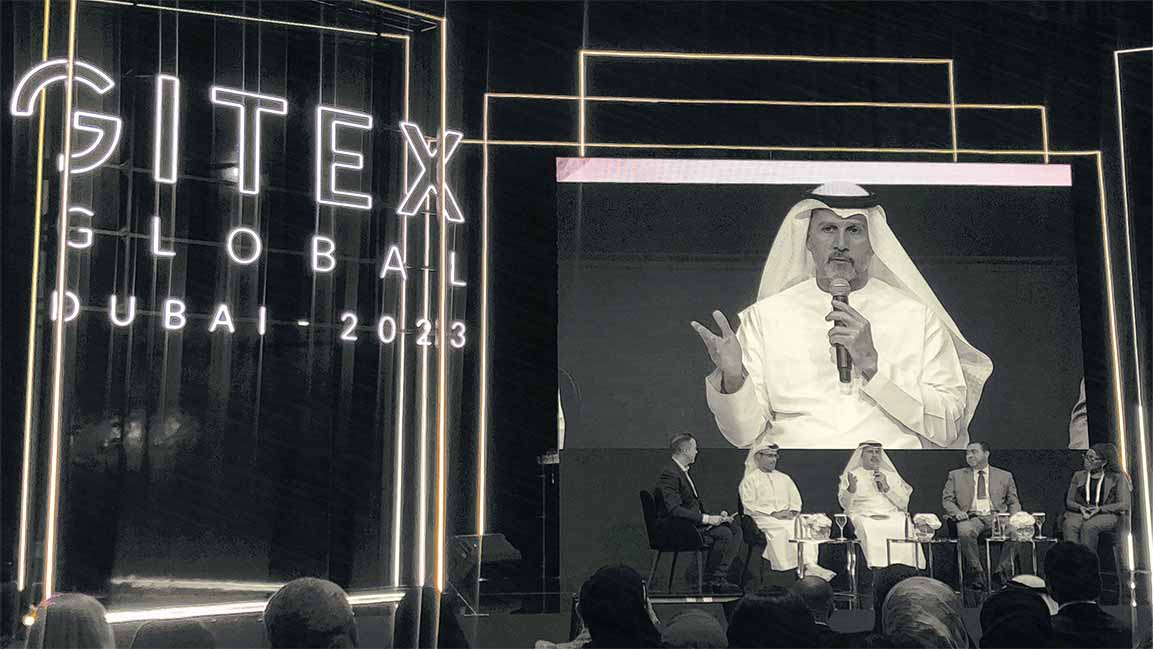- | 2:00 pm
GITEX sounds alarm about the escalating threat of cybercrime
Mohamed Al-Kuwaiti calls for investing in smart solutions and people training

In an era of increasing global interconnectivity, the mitigation of cyber risks necessitates a collaborative international endeavor.
“The risk has grown exponentially — being ahead of the curve involves investing in smart solutions,” said Mohamed Al-Kuwaiti, Head of Cybersecurity, UAE Government, at a panel titled Addressing Cybersecurity Challenges in the Energy Sector at GITEX Global.
The panel focused on the imperative for governments to prioritize critical infrastructure, such as energy, water, and transportation systems. Dr. Ahmed Abdul Hafez, Vice President for Cyber Security Affairs at Egypt’s National Telecommunication Regulatory Authority, shared insights into Egypt’s efforts to fortify its defenses against cyberattacks.
He stressed the vast geographical scope of Egyp and highlighted the significant interdependency between cyber and energy sectors. “Egypt strives to develop secure capabilities in power infrastructure,” he said.
The panel acknowledged that a lack of cybersecurity awareness and education remains a substantial challenge in the Middle East. Many individuals and organizations are ill-prepared to fend off cyber threats, leaving them vulnerable to potential attacks.
Sithembile Songo, Group Head of Information Security at Eskom Holdings in South Africa, underscored the challenges faced by South Africa and the need to ensure that cybersecurity does not exacerbate existing difficulties.
Al-Kuwaiti discussed the UAE’s approach to cybersecurity, emphasizing three pillars: technology, people, and governmental processes. He highlighted the role of AI in identifying patterns for the nuclear sector to build an effective immune system and the necessity of investing in people through training.
He also talked about the vulnerability of smart cities by citing an example of a simple cyberattack capable of disabling city lights. He stressed the urgent need for a “cybersecurity culture,” where everyone assumes the role of the first line of defense, making it a collective responsibility to build and propagate this culture within the nation.
Mohamed Al Hammadi, Managing Director and CEO of the Emirates Nuclear Energy Corporation in the UAE, highlighted the importance of understanding the risks of cyberattacks and vulnerabilities.
He encouraged individuals to recognize their role in the broader digital landscape, highlighting many open channels like phones, Wi-Fi, Bluetooth, and 5G connectivity. Al Hammadi stressed the significance of education and the need for highly competent talent to translate complex cybersecurity issues into actionable business strategies. He reinforced the notion that the risk of a cyberattack often stems from the weakest link in the security chain.
At the tech event, the UAE Cyber Security Council and Kaspersky signed a Memorandum of Understanding to educate and elevate the level of cyber readiness and resilience across all sectors of the economy.
Through this agreement, the UAE Cyber Security Council and Kaspersky will collaborate to share information on identifying, investigating, and responding to evolving cyber threats on time. The collaboration also extends to the exchange of expertise on the latest malware trends, indicators of compromise, and security risks faced by the country’s economic sectors, such as critical infrastructure.
“The ICT industry in the country has driven the economy forward by opening new windows of opportunity. But, it is also vulnerable to new security risks that are sophisticated, dynamic, and evolving that need to be curbed. To strengthen the economic environment of the UAE, it is important to establish ties with partners with the essential expertise and tools to eliminate information security incidents,” said Al Kuwaiti.
This year also marked the inaugural showcase of Cyber Valley, hosted by the UAE Cybersecurity Council. The Cyber Valley hosted various hackathons, engaging over 500 white-hat hackers across five challenges to address global tech issues. Participants also had the opportunity to explore X-Labs Security, a platform featuring technical talks and the latest product demonstrations.
Leading cybersecurity firms such as Huawei, Netscout, ESET, Norton, Palo Alto, and Fortinet are demonstrating how their solutions safeguard organizations’ most critical assets.































